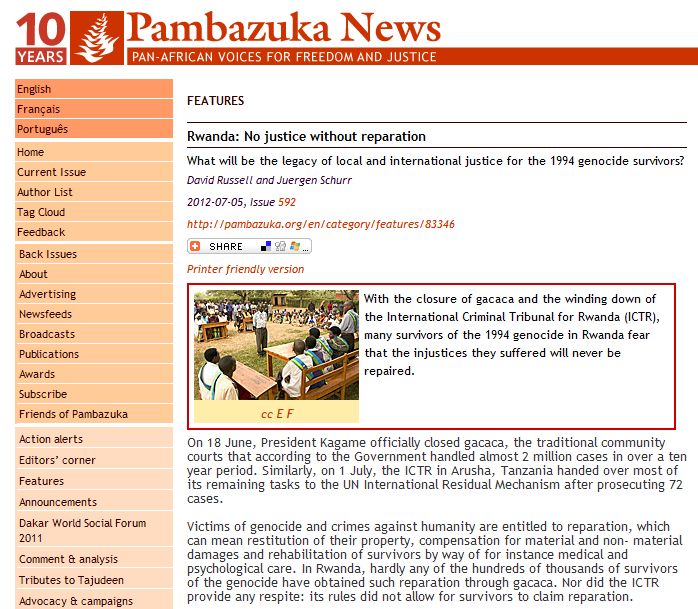
Rwanda: No justice without reparation by David Russell and Juergen Schurr
What will be the legacy of local and international justice for the 1994 genocide survivors?
On 18 June, President Kagame officially closed gacaca, the traditional community courts that according to the Government handled almost 2 million cases in over a ten year period. Similarly, on 1 July, the ICTR in Arusha, Tanzania handed over most of its remaining tasks to the UN International Residual Mechanism after prosecuting 72 cases.
Victims of genocide and crimes against humanity are entitled to reparation, which can mean restitution of their property, compensation for material and non- material damages and rehabilitation of survivors by way of for instance medical and psychological care. In Rwanda, hardly any of the hundreds of thousands of survivors of the genocide have obtained such reparation through gacaca. Nor did the ICTR provide any respite: its rules did not allow for survivors to claim reparation.
Many survivors have found it difficult to move on with their lives in the absence of meaningful justice and most continue to grapple with the financial, medical and psychological consequences of the genocide without assistance from the Government. This is particularly frustrating for survivors who contributed to making gacaca work. Hundreds of thousands of survivors testified before the 11,000 grassroots courts , often at the price of re-traumatisation, yet many feel that they ended up with nothing tangible at the end of that process.
When the Government of Rwanda introduced gacaca in 2001, it promised survivors that a law on compensation would be adopted to put in place a compensation fund, enabling survivors to make claims for damages, such as the loss of a relative. However, the fund was never established. In addition, the vast majority of gacaca judgments, which awarded survivors with restitution or compensation for damaged property were never fully enforced as the vast majority of those held to make amends were impecunious themselves. A recent survey by the Legal Aid Forum based on interviews with over 2,700 claimants shows that compensation and restition awards made by gacaca courts are the “hardest to enforce”, with 92% of all genocide related orders yet to be enforced.
The lack of adequate reparation on a national level is made worse by the complete absence of reparation at the international level.
With mounting dissatisfaction about the ICTR, in 2002, then ICTR President Pillay reminded the UN Security Council that “compensation for victims is essential if Rwanda is to recover from the genocidal experience”. A proposal submitted by ICTR judges to the UN Security Council sought to establish a specialised agency to administer a compensation scheme, but it was never taken up. Instead, the UN General Assembly adopted various resolutions requesting UN agencies to provide assistance to survivors, yet only little has been done to implement these resolutions. Indeed, while about $1 billion has been spent on the ICTR over the past 18 years, the cumulative UN funding for survivors’ organisations in Rwanda providing direct services to survivors amounts to less than $250, 000 annually.
The need for reparation will not go away, and both, the Rwandan Government and the UN have a role to play in ensuring that survivors receive what they are entitled to.
Many survivors believe that the Rwandan Government is responsible for establishing a compensation fund to help to compensate survivors where the perpetrators have not been identified. It would also step in to fund awards where perpetrators are too poor to pay compensation themselves. Judgments could then be enforced with the compensation fund, rather than depend on the ability (and often the willingness) of the perpetrator to pay. The Government argues that it is contributing already approximately 6% of its annual budget to an assistance fund providing health, education and housing services for the most vulnerable survivors and that it lacks the resources to do any more. This assistance is important, but only benefits a small minority of survivors and does not amount to reparation, failing to recognise that repairing the injuries suffered is integral to justice.
Ensuring adequate reparation for survivors in Rwanda will be a daunting task, given the magnitude and the scale of the genocide in 1994, but it is a task that should be carried out. While desirable, creating and financing a national compensation fund will be a challenge. Lessons could be learned from compensation funds established in countries such as Sierra Leone, South Africa and Morocco, countries with their own experiences of mass crimes. Some survivors and government officials suggest that sources of funding should include assets from convicted perpetrators, donations from other countries, voluntary contributions and UN funds. IBUKA, the umbrella organisation for survivors, has urged the Government to use profits from the General Interest Programme (TIG), wherein those convicted by gacaca carry out public service work, to contribute to the compensation of survivors.
In a recent report issued by the human rights organisations REDRESS and SURF, it was recommended to establish a national reparation task force to address outstanding issues, in particular identifying past compensation and restitution awards by gacaca. The task force could consult widely with survivors throughout the country, establish criteria for beneficiaries of reparation and recommend forms of reparation that are feasible and adequate for survivors. Any reparation programme could also cover medical and psychological support, in particular following gacaca, where hundreds of thousands of survivors testified, reliving traumatic events. The UN should consider contributing to a national reparation mechanism or, alternatively, it should establish an international or UN trust fund for survivors which could support projects in Rwanda benefiting survivors and build capacity of survivors’ organisations.
To ensure a positive legacy of gacaca among survivors, the Government of Rwanda should ensure that survivors’ needs and rights are met. Similarly, the UN should not abandon survivors after the closure of the ICTR.
First published at: http://pambazuka.org/en/category/features/83346. 2012-07-05, Issue 592
